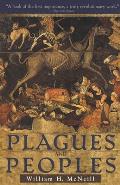 This book by William McNeil offers an interesting interpretation of the way that epidemic disease has shaped the course of world history from ancient times to the present day, a topic that the author asserts has been neglected in traditional historical accounts. The book is written in a charmingly old-fashioned style which is pleasant to read, although it is at times a bit tediously wordy and the citations are sparser than I would like.
This book by William McNeil offers an interesting interpretation of the way that epidemic disease has shaped the course of world history from ancient times to the present day, a topic that the author asserts has been neglected in traditional historical accounts. The book is written in a charmingly old-fashioned style which is pleasant to read, although it is at times a bit tediously wordy and the citations are sparser than I would like.
Nevertheless, here is one passage from the Introduction that I think provides a good example of the interesting theories underpinning this book:
Disease and parasitism play a pervasive role in all life. A successful search for food on the part of one organism becomes for its host a nasty infection or disease. All animals depend on other living things for food, and human beings are no exception. Problems of finding food and the changing ways human communities have done so are familiar enough in economic histories. The problems of avoiding becoming food for some other organism are less familiar, largely because from very early times human beings have ceased to have much to fear from large-bodied animal predators like lions or wolves. Nevertheless, one can properly think of most human lives as caught in a precarious equilibrium between the microparasitism of disease organisms and the macroparasitism of large-bodied predators, chief among which have been other human beings.
Originally published in 1977, parts are noticeably antiquated, but it remains an interesting and thought-provoking work which has sparked my interest in learning much more about the bubonic plague and the medieval period.
No comments:
Post a Comment
Note: Only a member of this blog may post a comment.